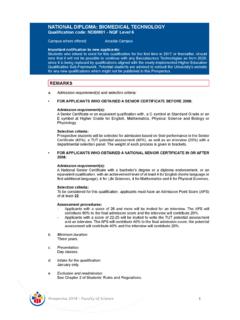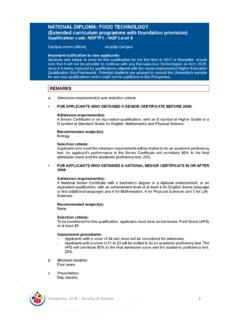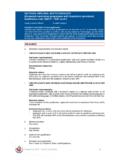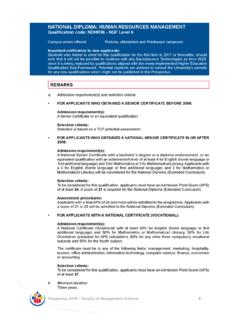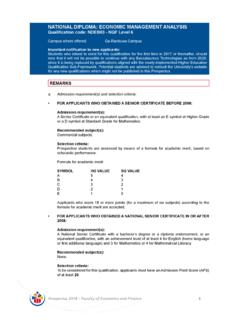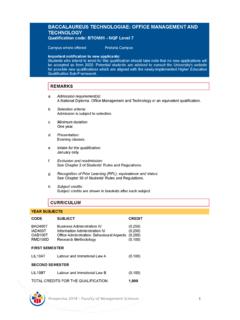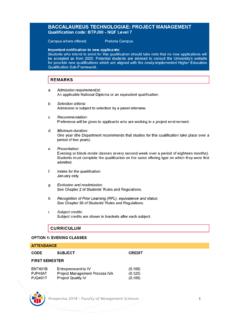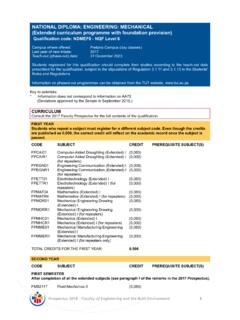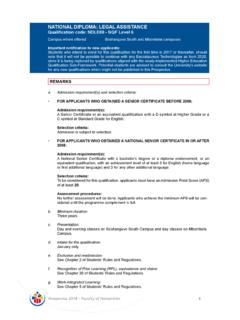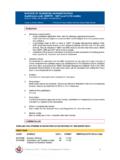Transcription of DIPLOMA IN FOOD TECHNOLOGY Dip (Food Technology) - …
1 DIPLOMA IN FOOD TECHNOLOGY . Dip (Food TECHNOLOGY ) - NQF Level 6 (360 credits). qualification code : DPFT19. SAQA ID: 100978, CHE NUMBER: H16/14269/HEQSF. Campus where offered: Arcadia Campus REMARKS. a. Admission requirement(s) and selection criteria: Please take note that all completed applications received within the published due dates will be ranked. After consideration of the Departmental Student Enrolment Plan, only the top ranking applicants will be selected. Once a programme is full, a waiting list will be in place to provide an opportunity for applicants to fill places of those who did not register on time. Applicants will be informed of their status per official letter from the Office of the Registrar, alternatively, they can check their application status on the TUT website, APPLICANTS WITH A SENIOR CERTIFICATE OBTAINED BEFORE 2008: Admission requirement(s): A Senior Certificate or an equivalent qualification , with an E symbol at Higher Grade or a D symbol at Standard Grade for English, Mathematics and Physical Science.
2 Recommended subject(s): Biology. Assessment procedure(s): For 2022: Applicants who meet the minimum requirements will be considered for admission. As from 2023: Applicants who meet the minimum requirements will be invited to submit a portfolio and to write an academic proficiency test. The APS will contribute 80% to the final admission score and the academic proficiency test will contribute 20%. APPLICANTS WITH A NATIONAL SENIOR CERTIFICATE OBTAINED IN OR AFTER 2008: Admission requirement(s): A National Senior Certificate with a bachelor's degree or a DIPLOMA endorsement, or an equivalent qualification , with an achievement level of at least 4 for English (home language or first additional language) and 4 for Mathematics or Technical Mathematics, 4 for Physical Sciences or Technical Sciences and 3 for Life Sciences. Recommended subject(s): None. Selection criteria: To be considered for this qualification , applicants must have an Admission Point Score (APS).
3 Of at least 21 (excluding Life Orientation). Assessment procedure(s): For 2022: Applicants with a score of 24 or more e will be considered for admission. As from 2023: Applicants with a score of 24 or more will be automatically accepted. Applicants with a score of 21 to 23 will be considered for admission, and will be invited to write an academic proficiency test. The APS will contribute 80% to the final admission score and the academic proficiency test will contribute 20%. b. Recognition of Prior Learning (RPL), equivalence and status: See Chapter 30 of Student's Rules and Regulations. 1 Faculty of Science c. Intake for the qualification : January only. d. Presentation: Day classes. e. Minimum duration: Three years. f. Exclusion and readmission: See Chapter 2 of Students' Rules and Regulations. g. WIL in Food TECHNOLOGY I: See Chapter 5 of Students' Rules and Regulations. CURRICULUM. FIRST YEAR. code MODULE NQF-L CREDIT PREREQUISITE MODULE(S). 11P105X Communication for Academic (5) (10).
4 Purposes CHM105X Chemistry I (5) (24). CPL105X Computer Literacy (5) (10). GMA105D General Mathematics I (5) (24). GPH105D General Physics I (5) (24). INI125D Information Literacy I (5) (2). (block module). LFI125X Life Skills I (block module) (5) (2). MIB105D Microbiology I (5) (24). FIRST SEMESTER. FTP115D Food TECHNOLOGY Preservation I (5) (12). TOTAL CREDITS FOR THE FIRST YEAR: 132. SECOND YEAR. code MODULE NQF-L CREDIT PREREQUISITE MODULE(S). FPD206D Food Product Development I (6) (24) Chemistry I. Food TECHNOLOGY Preservation I. Microbiology I. FTC206D Food TECHNOLOGY Commodities II (6) (24) Food TECHNOLOGY Preservation I. Microbiology I. MLB206D Molecular Biology II (6) (15) Microbiology I. FIRST SEMESTER. BAC216D Bioanalytical Chemistry II (6) (12) Chemistry I. BCH216D Biochemistry II (6) (12) Chemistry I. SECOND SEMESTER. FCM216D Food Chemistry II (6) (12) Bioanalytical Chemistry II. Biochemistry II. Chemistry I. 2 Faculty of Science MBT216D Microbial Taxonomy II (6) (15) Microbiology I.
5 TOTAL CREDITS FOR THE SECOND YEAR: 114. THIRD YEAR. code MODULE NQF-L CREDIT PREREQUISITE MODULE(S). FIRST SEMESTER. FIM316D Food Industry Management I (6) (12). FOM316D Food Microbiology III (6) (15) Microbial Taxonomy II. Molecular Biology II. FPE316D Food Process Engineering I (6) (12) General Mathematics I. General Physics I. FQA316D Food Quality Assurance I (6) (15) Food TECHNOLOGY Commodities II. Microbiology I. TOTAL CREDITS FOR THE SEMESTER: 60. SECOND SEMESTER. On completion of all the modules. If a student has one outstanding module, that particular case will be reviewed and permission might be granted in collaboration with the specific employer. WFT316D WIL in Food TECHNOLOGY I (6) (60). (first- or second-semester module). TOTAL CREDITS FOR THE SEMESTER: 60. TOTAL CREDITS FOR THE THIRD YEAR: 114. TOTAL CREDITS FOR THE qualification : 360. MODULE INFORMATION (OVERVIEW OF SYLLABUS). The syllabus content is subject to change to accommodate industry changes.
6 Please note that a more de- tailed syllabus is available at the Department or in the study guide that is applicable to a particular module. At time of publication, the syllabus content was defined as follows: B. BIOANALYTICAL CHEMISTRY II (BAC216D) 1 X 3-HOUR PAPER. (Module custodian: Department of Chemistry). Introduction to bioanalytical chemistry. The role and importance of analytical chemistry in everyday life. Perform analytical chemistry calculations. Calculate the amount required to prepare accurate concentrations of solu- tions. Apply titration method to quantify the content of acid or a base. Apply appropriate procedure to determine unknown analyte quantity in a given sample. Identify and explain the functions of the components of spectro- photometer and chromatographic instrument. Apply the fundamental laws of photometry to solve spectroscopic problems. Separate and identify analytes by applying appropriate chromatographic principles. Compile and present report.
7 (Total notional time: 120 hours). BIOCHEMISTRY II (BCH216D) 1 X 3-HOUR PAPER. (Module custodian: Department of Biomedical Sciences). The Organisation of a cell. Molecular structure of amino acids and proteins. Enzyme Kinetics. Carbohydrates. Lipids. Nucleic acids. Reagents, pH and buffers. (Total notional time: 120 hours). 3 Faculty of Science C. CHEMISTRY I (CHM105X) 1 X 3-HOUR PAPER. (Module custodian: Department of Chemistry). The role and importance of chemistry in everyday life. Classification and properties of matter. Units of measure- ment. Atoms, molecules and ions. The modern view of atomic structure and the use of electron configurations in chemical bonding. The periodic table of elements. The use of IUPAC rules for naming inorganic compounds. Application of the mole concept in stoichiometric calculations. Reactions in aqueous solutions. Chemical equilibrium. Fundamental concepts in electrochemistry. Organic nomenclature. (Total notional time: 240 hours).
8 COMMUNICATION FOR ACADEMIC PURPOSES (11P105X) 1 X 3-HOUR PAPER. (Module custodian: Office of the Executive Dean). A workable knowledge of English is an essential skill for any graduate who is required to conduct themselves successfully in a professional working environment. This module will equip students with the competencies required to compose a selection of written texts related to communicating both internally and externally within a professional environment. In addition, the module includes strategies that are essential for the effective com- munication in various situations, including small groups to avoid unproductive conflict, a multicultural context, etc. (Total notional time: 100 hours). COMPUTER LITERACY (CPL105X) CONTINUOUS ASSESSMENT. (Module custodian: End User Computing Unit). This module provides students with foundational knowledge in computing fundamentals, essential digital skills in key applications based on MS Office Suite and network basics ( MS Outlook and Internet).
9 Online exams are mapped with End-User Computing: SAQA 49077 (61591) Core Element as well as Internet and Computing Core Certification (IC3). (Total notional time: 100 hours). F. FOOD CHEMISTRY II (FCM216D) 1 X 3-HOUR PAPER. (Module custodian: Department of Biotechnology and Food TECHNOLOGY ). Study of the major chemical components of food, the chemical changes they undergo during processing and storage and methods used to analyse them. Major chemical components include: sugars. Polysaccharides, lipids, proteins, colours, flavours, water, and Laboratory safety and rules. Guidelines for practical report writing. (Total notional time: 120 hours). FOOD INDUSTRY MANAGEMENT I (FIM316D) 1 X 3-HOUR PAPER. (Module custodian: Department of Management and Entrepreneurship). Introduction to business and its challenges. The business environment. The task of management. Operations management. Logistics management. Financial management. Human resources management. Marketing man- agement.
10 Entrepreneurship. The business plan. (Total notional time: 120 hours). FOOD MICROBIOLOGY III (FOM316D) 1 X 3-HOUR PAPER. (Module custodian: Department of Biotechnology and Food TECHNOLOGY ). Importance of food microbiology, microbial and mycological spoilage of food, factors influencing microbial spoil- age of foods will covered including: Microbial growth, survival and death. Spores and their significance. Detec- tion and enumeration of microbes in food. Indicator microorganisms and microbiological criteria. Gram negative foodborne pathogenic bacteria. Gram positive foodborne pathogenic bacteria and other detrimental organisms associated with food. Microorganisms used in fermented foods. Spoilage organisms. Molds. Chemical preserva- tives. (Total notional time: 150 hours). FOOD PROCESS ENGINEERING I (FPE316D) 1 X 3-HOUR PAPER. (Module custodian: Department of Biotechnology and Food TECHNOLOGY ). Units, dimensions and definitions. Material balances. Energy and Energy balances.
